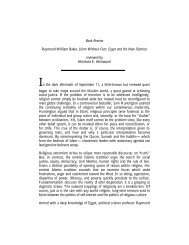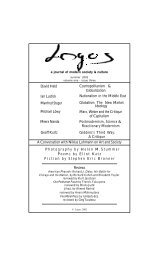Michael J. Thompson Stephen Eric Bronner Wadood Hamad - Logos
Michael J. Thompson Stephen Eric Bronner Wadood Hamad - Logos
Michael J. Thompson Stephen Eric Bronner Wadood Hamad - Logos
Create successful ePaper yourself
Turn your PDF publications into a flip-book with our unique Google optimized e-Paper software.
Kurt Jacobsen<br />
the man behind the curtain, Berman admonishes, watch the impressive<br />
fireworks and shut up.<br />
Berman is wary of realists, too. Realists figure that “world politics is driven by<br />
wealth, power, and geography” (although a lot of realists overlook the role of<br />
wealth). While it may be unwise to start or end with realist precepts about<br />
power, one cannot ignore them, as Berman does, when examining how the<br />
world works. To characterize the first Gulf War as fought in defense of<br />
Muslims in Kuwait and Saudi Arabia is mad hatter logic—like saying the<br />
U.S. cavalry wiped out the Indians to protect Chinese coolies toiling on the<br />
railroads. In this same vein, Berman imagines that America sided with the<br />
Palestinans. He even quotes an Israeli negotiator lauding Clinton for doing<br />
more for the Palestinians than any one else. It’s rather like a participant<br />
praising the diplomatic feats of Chamberlain at Munich.<br />
Turning to Islam after a brief detour through Camus, Berman contends that<br />
“pan-Arabism and the philosophical roots of Europe’s right wing<br />
nationalisms were the same.” Islamic extremism (unlike other religious<br />
extremisms?) preaches utter obedience to an unrealizable ideal, and so<br />
generates totalitarianism. Totalitarianism and terror are the same. So terror,<br />
as defined by the White House, is totalitarian. Naturally, Berman exempts<br />
state-sponsored terrorism. All progress, he also says, depended on “a freedom<br />
that recognizes the existence of other freedoms too.” This sounds okay, but<br />
he blithely proceeds to applaud “the idea of progress toward ever more<br />
freedom, ever more rationality, ever more wealth”—as if these pursuits were<br />
not difficult to coordinate, or were not contradictory.<br />
To sustain the pretty notion that liberal democratic societies cannot do<br />
systematically illiberal things, he predictably taps a “heart of darkness”<br />
argument about King Leopold’s atrocities in the Congo. There, liberal<br />
colonialists, evidently demented by the primitive milieu, took up “murder for<br />
murders sake.” No, it was murder for profit’s sake. They operated in environs<br />
where it was expeditious to work natives to death to extract resources quickly.<br />
Liberals aren’t immune to such tempting incentives. Why that would be<br />
irrational. One would never guess when reading Berman that the simpleminded<br />
Western optimists of the nineteenth century, as he describes them,<br />
swiftly conquered 85% of the earth.<br />
Berman’s knowledge of Islam is, to say the least, shaky. He states: “Islamism<br />
got under way in Pakistan in the 1930s (organizationally in 1941),” when<br />
<strong>Logos</strong> 2.3 – Summer 2003




